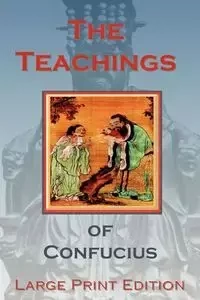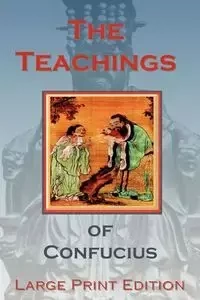The Teachings of Confucius - Large Print Edition - Confucius
The Teachings of Confucius - Large Print Edition - Confucius
AutorzyConfucius
The Analects is the most important of the teachings of Confucius. It is a collection of speeches and discussions between Confucius and his various disciples that illustrate his precepts: that anyone, regardless of his station in life, could become a superior man by living a virtuous life. The Great Learning is a protocol for living, even the humblest actions of everyday living. It is embodied by the practice illustrated by the Seven Steps. The Doctrine of the Mean deals with the means of achieving perfect virtue by following the middle way. It is a Heavenly prescription of the golden path by which learning and teaching ultimately unfold into perfect virtue. Like other great teachers, Confucius advocated action based on empathy; on practicing The Golden Rule by only doing unto others as you would have them do unto you. His aim was to improve the value and quality of life for all mankind.
Excerpt. © Reprinted by permission. All rights reserved.
The Analects
Book 1, Hsio R
The Master said, "Is it not pleasant to learn with a constant perseverance and application?
"Is it not delightful to have friends coming from distant quarters?
"Is he not a man of complete virtue, who feels no discomposure though men may take no note of him?"
The philosopher Yu said, "They are few who, being filial and fraternal, are fond of offending against their superiors. There have been none, who, not liking to offend against their superiors, have been fond of stirring up confusion.
"The superior man bends his attention to what is radical. That being established, all practical courses naturally grow up. Filial piety and fraternal submission,-are they not the root of all benevolent actions?"
The Master said, "Fine words and an insinuating appearance are seldom associated with true virtue."
The philosopher Tsang said, "I daily examine myself on three points:-whether, in transacting business for others, I may have been not faithful;-whether, in intercourse with friends, I may have been not sincere;-whether I may have not mastered and practiced the instructions of my teacher."
The Master said, "To rule a country of a thousand chariots, there must be reverent attention to business, and sincerity; economy in expenditure, and love for men; and the employment of the people at the proper seasons."
The Master said, "A youth, when at home, should be filial, and, abroad, respectful to his elders. He should be earnest and truthful. He should overflow in love to all, and cultivate the friendship of the good. When he has time and opportunity, after the performance of these things, he should employ them in polite studies."
Tsze-hsia said, "If a man withdraws his mind from the love of beauty, and applies it as sincerely to the love of the virtuous; if, in serving his parents, he can exert his utmost strength; if, in serving his prince, he can devote his life; if, in his intercourse with his friends, his words are sincere:-although men say that he has not learned, I will certainly say that he has.
The Master said, "If the scholar be not grave, he will not call forth any veneration, and his learning will not be solid.
"Hold faithfulness and sincerity as first principles.
"Have no friends not equal to yourself.
"When you have faults, do not fear to abandon them."
EAN: 9781934255230
Symbol
460ERS03527KS
Rok wydania
2009
Elementy
176
Oprawa
Miekka
Format
15.2x22.9cm
Redakcja
Conners Shawn
Język
angielski

Bez ryzyka
14 dni na łatwy zwrot

Szeroki asortyment
ponad milion pozycji

Niskie ceny i rabaty
nawet do 50% każdego dnia
Niepotwierdzona zakupem
Ocena: /5
Symbol
460ERS03527KS
Kod producenta
9781934255230
Autorzy
Confucius
Rok wydania
2009
Elementy
176
Oprawa
Miekka
Format
15.2x22.9cm
Redakcja
Conners Shawn
Język
angielski

The teachings of the great Chinese philosopher Confucius have had as great an impact on the culture of the Far East as The Bible has had on the culture of the West. As they are presented here, The Teachings of Confucius consists of "The Analects," "The Great Learning" and "The Doctrine of the Mean."
The Analects is the most important of the teachings of Confucius. It is a collection of speeches and discussions between Confucius and his various disciples that illustrate his precepts: that anyone, regardless of his station in life, could become a superior man by living a virtuous life. The Great Learning is a protocol for living, even the humblest actions of everyday living. It is embodied by the practice illustrated by the Seven Steps. The Doctrine of the Mean deals with the means of achieving perfect virtue by following the middle way. It is a Heavenly prescription of the golden path by which learning and teaching ultimately unfold into perfect virtue. Like other great teachers, Confucius advocated action based on empathy; on practicing The Golden Rule by only doing unto others as you would have them do unto you. His aim was to improve the value and quality of life for all mankind.
Excerpt. © Reprinted by permission. All rights reserved.
The Analects
Book 1, Hsio R
The Master said, "Is it not pleasant to learn with a constant perseverance and application?
"Is it not delightful to have friends coming from distant quarters?
"Is he not a man of complete virtue, who feels no discomposure though men may take no note of him?"
The philosopher Yu said, "They are few who, being filial and fraternal, are fond of offending against their superiors. There have been none, who, not liking to offend against their superiors, have been fond of stirring up confusion.
"The superior man bends his attention to what is radical. That being established, all practical courses naturally grow up. Filial piety and fraternal submission,-are they not the root of all benevolent actions?"
The Master said, "Fine words and an insinuating appearance are seldom associated with true virtue."
The philosopher Tsang said, "I daily examine myself on three points:-whether, in transacting business for others, I may have been not faithful;-whether, in intercourse with friends, I may have been not sincere;-whether I may have not mastered and practiced the instructions of my teacher."
The Master said, "To rule a country of a thousand chariots, there must be reverent attention to business, and sincerity; economy in expenditure, and love for men; and the employment of the people at the proper seasons."
The Master said, "A youth, when at home, should be filial, and, abroad, respectful to his elders. He should be earnest and truthful. He should overflow in love to all, and cultivate the friendship of the good. When he has time and opportunity, after the performance of these things, he should employ them in polite studies."
Tsze-hsia said, "If a man withdraws his mind from the love of beauty, and applies it as sincerely to the love of the virtuous; if, in serving his parents, he can exert his utmost strength; if, in serving his prince, he can devote his life; if, in his intercourse with his friends, his words are sincere:-although men say that he has not learned, I will certainly say that he has.
The Master said, "If the scholar be not grave, he will not call forth any veneration, and his learning will not be solid.
"Hold faithfulness and sincerity as first principles.
"Have no friends not equal to yourself.
"When you have faults, do not fear to abandon them."
EAN: 9781934255230
The Analects is the most important of the teachings of Confucius. It is a collection of speeches and discussions between Confucius and his various disciples that illustrate his precepts: that anyone, regardless of his station in life, could become a superior man by living a virtuous life. The Great Learning is a protocol for living, even the humblest actions of everyday living. It is embodied by the practice illustrated by the Seven Steps. The Doctrine of the Mean deals with the means of achieving perfect virtue by following the middle way. It is a Heavenly prescription of the golden path by which learning and teaching ultimately unfold into perfect virtue. Like other great teachers, Confucius advocated action based on empathy; on practicing The Golden Rule by only doing unto others as you would have them do unto you. His aim was to improve the value and quality of life for all mankind.
Excerpt. © Reprinted by permission. All rights reserved.
The Analects
Book 1, Hsio R
The Master said, "Is it not pleasant to learn with a constant perseverance and application?
"Is it not delightful to have friends coming from distant quarters?
"Is he not a man of complete virtue, who feels no discomposure though men may take no note of him?"
The philosopher Yu said, "They are few who, being filial and fraternal, are fond of offending against their superiors. There have been none, who, not liking to offend against their superiors, have been fond of stirring up confusion.
"The superior man bends his attention to what is radical. That being established, all practical courses naturally grow up. Filial piety and fraternal submission,-are they not the root of all benevolent actions?"
The Master said, "Fine words and an insinuating appearance are seldom associated with true virtue."
The philosopher Tsang said, "I daily examine myself on three points:-whether, in transacting business for others, I may have been not faithful;-whether, in intercourse with friends, I may have been not sincere;-whether I may have not mastered and practiced the instructions of my teacher."
The Master said, "To rule a country of a thousand chariots, there must be reverent attention to business, and sincerity; economy in expenditure, and love for men; and the employment of the people at the proper seasons."
The Master said, "A youth, when at home, should be filial, and, abroad, respectful to his elders. He should be earnest and truthful. He should overflow in love to all, and cultivate the friendship of the good. When he has time and opportunity, after the performance of these things, he should employ them in polite studies."
Tsze-hsia said, "If a man withdraws his mind from the love of beauty, and applies it as sincerely to the love of the virtuous; if, in serving his parents, he can exert his utmost strength; if, in serving his prince, he can devote his life; if, in his intercourse with his friends, his words are sincere:-although men say that he has not learned, I will certainly say that he has.
The Master said, "If the scholar be not grave, he will not call forth any veneration, and his learning will not be solid.
"Hold faithfulness and sincerity as first principles.
"Have no friends not equal to yourself.
"When you have faults, do not fear to abandon them."
EAN: 9781934255230
Niepotwierdzona zakupem
Ocena: /5
Zapytaj o produkt
Niepotwierdzona zakupem
Ocena: /5
Napisz swoją opinię

